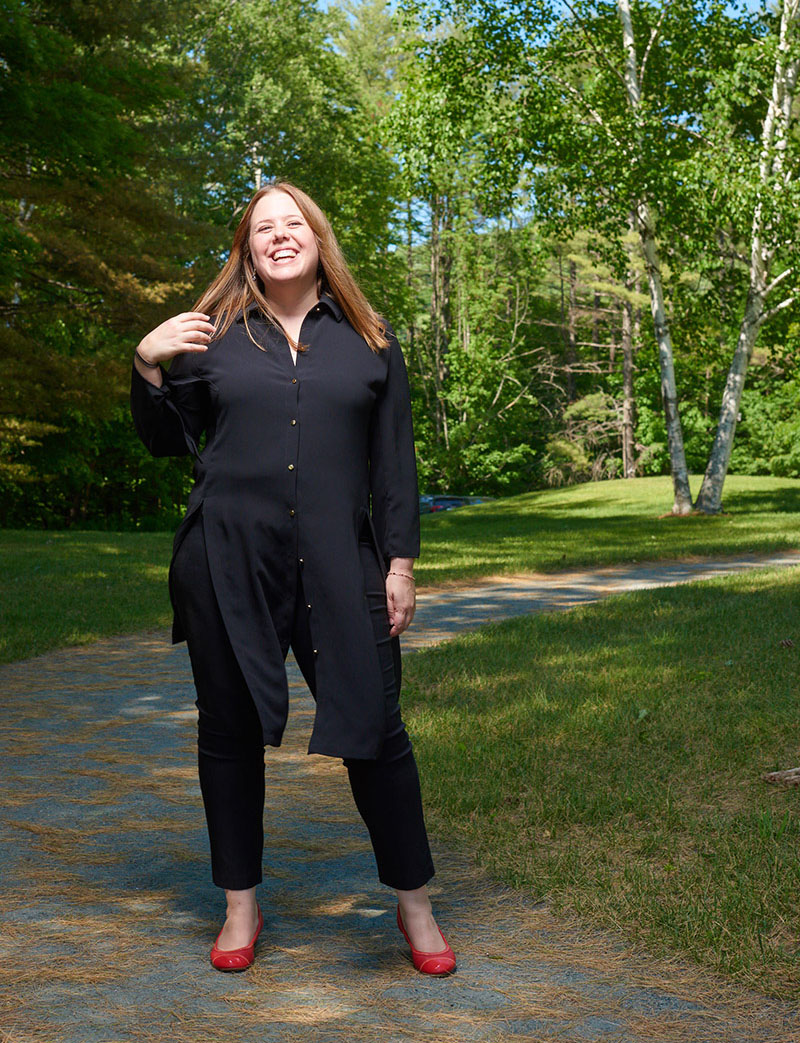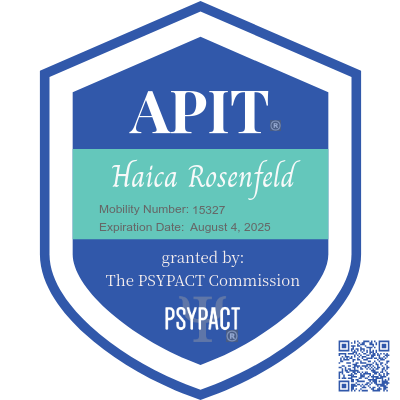Licensed Clinical Psychologist & Certified Eating Disorders Specialist
“I believe in empowering your well-being and prioritizing health-promoting behaviors without focusing on weight loss.”- Haica Rosenfeld, PsyD, CEDS-C

I’m Dr. Haica Rosenfeld, a Licensed Clinical Psychologist, Certified Eating Disorders Specialist and Approved Consultant by the International Association of Eating Disorders Professionals. I currently work in Private Practice in Florida. I also provide Telehealth or Online psychotherapy to residents in the states of AL, AZ, AR, CO, CT, DE, DC, FL, GA, ID, IL, IN, KS, KY, ME, MD, MI, MN, MO, MS, NE, NV, NH, NJ, NC, ND, OH, OK, PA, RI, SC, SD, TN, TX, UT, VA, VT, WA, WV, WI, WY and in Venezuela. I’m dedicated to and passionate about helping my clients heal their relationship with food, exercise, and their bodies, as well as disrupting the internalized messages they’ve received from diet culture.
I have worked for over 17 years in the field of eating disorders and body image healing. I am passionate about helping people make peace with food, whether that means overcoming eating disorders, disordered eating, living a life free of chronic dieting, or learning intuitive eating, finding pleasure in joyful movement and practicing a body-positive approach to wellness.
Meet Kuma
My Certified Therapy Dog
I often bring my beloved Goldendoodle, Kuma, into the office. He began working when he was 8 weeks old. Since then, he has worked in several different settings alongside me, bringing joy and comfort to my clients. Kuma has received his certification as a Canine Good Citizen and as a Certified Therapy Dog by Canine Assited Therapy Inc in Florida.

My Philosophy
My mission is to support you while establishing a peaceful relationship with food and your body through a sustainable approach to wellness and health. That is why in my practice I use a blend of mindfulness, self-compassion, Internal Family Systems (parts work) and a non-diet focused approach to wellness and whole health. My practice philosophy is informed by Health At Every Size and Intuitive Eating principles, and I am passionate about advocating for compassionate and weight-inclusive efforts toward improving health access and reducing weight stigma.
FAQ about My Philosophy & Training
What is Diet-Culture?
We live in a diet driven culture that makes people struggle with their relationship with food and their bodies. Whether it is by dieting to fight against their natural size and fit into society ideal size; using food to cope with difficult feelings; or losing touch with internal hunger, satiety cues and pleasure with food, because of emotional turmoil, stress, or mental health struggles. Diet culture makes it difficult to trust our bodies and figure out how to feed and nourish ourselves. Therapy with me can help you explore the roots of your eating behavior, get a better understanding of the role these behaviors have in your life, and create an individualized treatment plan to move you toward a greater sense of well-being, selftrust and empowerment.
What is 'a non-diet and weight-inclusive approach'?
My practice moves away from a weight-centric or weight-normative approach that emphasizes weight and weight loss as defining factors of health and wellbeing, to a weight-inclusive approach, which emphasizes viewing health and wellbeing as multifaceted; weight is not the focal point of health, and size and weight are not viewed as behaviors to be fixed; aims to do no harm and reduce weight stigma; rests on the assumption that everybody is capable of achieving health and well-being independent of weight, given access to non-stigmatizing health care. This approach challenges the belief that a particular BMI reflects a particular set of health practices, health status, or moral character.
What is 'Health At Every Size' (HAES)?
The Health At Every Size® Principles are:
1. Weight Inclusivity: Accept and respect the inherent diversity of body shapes and sizes and reject the idealizing or pathologizing of specific weights.
2. Health Enhancement: Support health policies that improve and equalize access to information and services, and personal practices that improve human wellbeing, including attention to individual physical, economic, social, spiritual, emotional, and other needs.
3. Respectful Care: Acknowledge our biases, and work to end weight discrimination, weight stigma, and weight bias. Provide information and services from an understanding that socio-economic status, race, gender, sexual orientation, age, and other identities impact weight stigma, and support environments that address these inequities.
4. Eating for Well-being: Promote flexible, individualized eating based on hunger, satiety, nutritional needs, and pleasure, rather than any externally regulated eating plan focused on weight control.
5. Life-Enhancing Movement: Support physical activities that allow people of all sizes, abilities, and interests to engage in enjoyable movement, to the degree that they choose. To learn more about HAES visit www.sizediversityandhealth.org
What is Intuitive Eating?
Intuitive eating is an approach that was created by two registered dietitians, Evelyn Tribole, MS, RDN, CEDRD-S and Elyse Resch, MS, RDN, CEDRD-S, Fiaedp, FADA, FAND, in 1995. It is aligned with a nondiet approach to health and wellness that helps you tune into your body signals, break the cycle of chronic dieting and heal your relationship with food. Intuitive Eating is the practice of mostly using internal cues, rather than external rules, to guide your food choices and decisions about when and how much to eat. Approaching food and movement choices from a place of self-care, permission, and body acceptance rather than selfcontrol, deprivation, diet culture and weight stigma. It has 10 principles and you can learn more about it at www.intuitiveeating.org
What type of training did you receive?
I first became a psychologist in Venezuela and worked in my community as a school psychologist. I later earned my Master’s and Doctorate in Clinical Psychology from the Institute for Graduate Clinical Psychology at Widener University in Pennsylvania. I completed her pre-doctoral internship at The Delaware Psychiatric Center and La Salle University’s Student Counseling Center, where I became increasingly interested in the treatment of eating disorders. My post-doctoral residency was completed at The Renfrew Center of South Florida, the country’s first residential treatment facility for woman with eating disorders. While at the Renfrew Center, I worked as a primary therapist in their residential program for eating disorders, and provided individual, family and group therapy.
Where have you worked in the past?
After years of experience in Private Practice and focusing on the treatment of individual struggling with Eating Disorders, Disordered Eating and Body Image concerns, I perceived a need for specialized treatment of Binge Eating Disorder. Driven by my passion, I decided to move to Vermont and accept the position of Clinical Psychologist at a retreat center for women. While I was there, I provided weekly intensive therapeutic treatment to women struggling with binge and emotional overeating, and led daily group workshops at the retreat, informed by principles of weight inclusivity, Health at Every Size®, mindfulness and intuitive eating.
Which Professional Organizations are you a member of?
I am a professional member of the American Psychological Association (APA), the Florida Psychological Association (FPA), and have served as the Fundraising Committee Chair and Vice-president of the International Association of Eating Disorder Professionals (IAEDP) Miami Chapter and I am a past member of the Certification Committee for IAEDP International.

